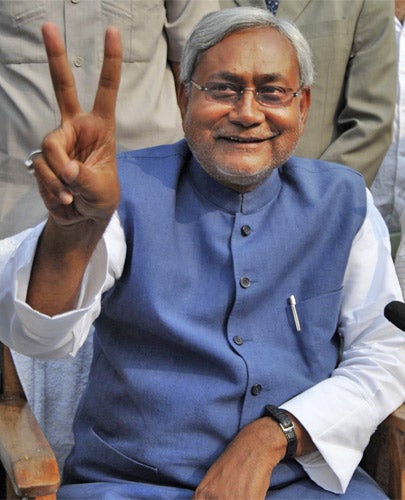Election win strikes blow against India's caste system

Your support helps us to tell the story
From reproductive rights to climate change to Big Tech, The Independent is on the ground when the story is developing. Whether it's investigating the financials of Elon Musk's pro-Trump PAC or producing our latest documentary, 'The A Word', which shines a light on the American women fighting for reproductive rights, we know how important it is to parse out the facts from the messaging.
At such a critical moment in US history, we need reporters on the ground. Your donation allows us to keep sending journalists to speak to both sides of the story.
The Independent is trusted by Americans across the entire political spectrum. And unlike many other quality news outlets, we choose not to lock Americans out of our reporting and analysis with paywalls. We believe quality journalism should be available to everyone, paid for by those who can afford it.
Your support makes all the difference.India's ruling Congress Party is reeling after a charismatic opposition politician scored a landslide victory in a local poll, thereby undermining caste-based politics in one of the country's poorest states.
A coalition led by Nitish Kumar, chief minister of the northern state of Bihar, looks set to take at least three-quarters of assembly seats. Congress suffered an embarrassingly large defeat, despite the involvement in its campaign of Rahul Gandhi, widely anticipated to be a future prime minister.
Last night, with the final tally still to be declared, Mr Kumar said the result was a victory for his political style.
"The question before the people of Bihar was whether they would move forward or whether they would return to the old ways. The people have decided to move forward. It is their victory. Development has won. It is clear the people wish to see Bihar move forward on the path of progress," he said.
The reselection of the 59-year-old was widely interpreted as a victory for responsive politics and seen as a blow against the caste-based factionalism that has dominated much of north India's regional politics in recent years.
For decades, the state of Bihar was considered a depressing example of the failure of large parts of India to move forward and tackle poverty. Unemployment was high, development was low and there was widespread migration to cities such as Delhi and Mumbai by those looking for work or even a sense of hope. Along with Uttar Pradesh, Rajasthan and Madhya Pradesh, Bihar was one of India's worst performing states on malnutrition, infant mortality and education.
Politics was dominated by the leaders of caste-based parties, perhaps most notoriously Lalu Prasad, who served for many years as the chief minister. When corruption charges against him mounted in the late 90s, he stood down and his wife took over running the state. Analysts say after Mr Kumar, whose Janata Dal (United) party fought the campaign in coalition with the Hindu nationalist Bharatiya Janata Party, took office in 2005, growth in the state built new steam. Large sums were spent in a road building programme, efforts were made to tackle lawlessness and corruption and there was fresh investment in healthcare and education. Between 2004 and 2009, the state's economy grew at around 11.35 per cent each year, more than the national average. During the previous five years it had grown at around 3.5 per cent.
MJ Akbar, a veteran writer and political analyst, said: "This is a reward of delivery politics – that is the most obvious thing. But the Congress Party need to realise that India's politics is not based on a family vote."
The victory of Mr Kumar, who hails from a small, low Hindu caste, comes as the Congress Party is already on the back foot over swirling allegations of corruption, focusing on the auction of 2G telephone licenses. While a telecommunications minister accused of losing many billions of pounds was forced to resign, opposition politicians have demanded to know why the Prime Minister Manmohan Singh did not take action earlier. The issue has even seen questions raised by the Supreme Court.
Join our commenting forum
Join thought-provoking conversations, follow other Independent readers and see their replies
Comments